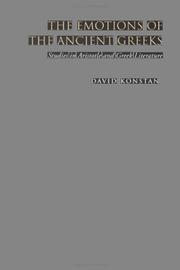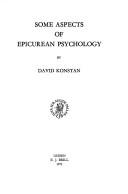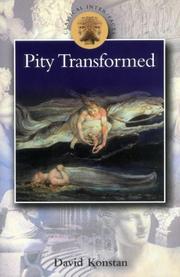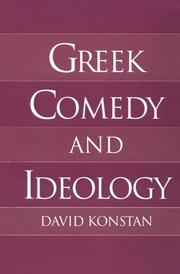| Listing 1 - 10 of 109 | << page >> |
Sort by
|
Book
ISBN: 902560742X Year: 1977 Publisher: Amsterdam Hakkert
Abstract | Keywords | Export | Availability | Bookmark
 Loading...
Loading...Choose an application
- Reference Manager
- EndNote
- RefWorks (Direct export to RefWorks)
Catullus, Caius Valerius --- Political poetry, Latin --- -Rome in literature --- Latin political poetry --- Latin poetry --- History and criticism --- Catullus, Gaius Valerius --- Catul --- Catull --- Catulle --- Catulli, C. Valerii --- Catullo, Gaio Valerio --- Catullus, C. Valerius --- Catullus, Gaius Valerius, --- Catullus, Gajus Valerius --- Catulo --- Katull, Gaǐ Valeriǐ --- Katullus, Kaius Valerius --- Valerio Cátulo, Cayo --- Катулл --- Rome in literature. --- History and criticism. --- Catullus, Gaius Valerius. --- Rome --- In literature.

ISBN: 0802091032 9780802091031 0802095585 9786611992002 1442674377 1281992003 9780802095589 9781442674370 1442691182 Year: 2006 Volume: *2 Publisher: Toronto
Abstract | Keywords | Export | Availability | Bookmark
 Loading...
Loading...Choose an application
- Reference Manager
- EndNote
- RefWorks (Direct export to RefWorks)
"It is generally assumed that whatever else has changed about the human condition since the dawn of civilization, basic human emotions - love, fear, anger, envy, shame - have remained constant. David Konstan, however, argues that the emotions of the ancient Greeks were in some significant respects different from our own, and that recognizing these differences is important to understanding ancient Greek literature and culture."--Jacket.
Emotions (Philosophy). --- Emotions in literature. --- Greek literature --- Émotions (Philosophie). --- Émotions dans la littérature. --- Littérature grecque --- History and criticism. --- Histoire et critique. --- Aristotle. --- Aristotle --- Psychology. --- Emotions in literature --- Emotions (Philosophy) --- Philosophy --- History and criticism --- Aristoteles --- Aristote --- Aristotile --- Aristoteles. --- Aristote. --- Et la psychologie. --- Emotions (Philosophie) --- Littérature grecque --- Emotions dans la littérature --- Histoire et critique --- Contributions in psychology. --- Émotions (Philosophie) --- Émotions dans la littérature. --- Arisṭāṭṭil --- Aristo, --- Aristotel --- Aristotele --- Aristóteles, --- Aristòtil --- Arisṭū --- Arisṭūṭālīs --- Arisutoteresu --- Arystoteles --- Ya-li-shih-to-te --- Ya-li-ssu-to-te --- Yalishiduode --- Yalisiduode --- Ἀριστοτέλης --- Αριστοτέλης --- Аристотел --- ארסטו --- אריםטו --- אריסטו --- אריסטוטלס --- אריסטוטלוס --- אריסטוטליס --- أرسطاطاليس --- أرسططاليس --- أرسطو --- أرسطوطالس --- أرسطوطاليس --- ابن رشد --- اريسطو --- Pseudo Aristotele --- Pseudo-Aristotle --- アリストテレス --- Greek literature - History and criticism. --- Aristotle. - Rhetoric. --- Aristotle - Psychology. --- Rhetoric (Aristotle) --- Retorica (Aristotle) --- On rhetoric (Aristotle) --- Grylus (Aristotle) --- Rhetorica (Aristoteles) --- Rhetorica (Aristotle) --- De arte rhetorica libri tres (Aristotle) --- Aristotelis Stagyritae De arte rhetorica libri tres (Aristotle) --- Litterature grecque --- Emotions dans la litterature.

ISBN: 9004036539 9004320466 9789004036536 Year: 1973 Volume: v. 25 Publisher: Leiden, Netherlands : E. J. Brill,
Abstract | Keywords | Export | Availability | Bookmark
 Loading...
Loading...Choose an application
- Reference Manager
- EndNote
- RefWorks (Direct export to RefWorks)
Emotions --- Human behavior --- Comportement humain --- Epicurus --- Lucretius Carus, Titus --- Action, Human --- Behavior, Human --- Ethology --- Human action --- Human beings --- Human biology --- Physical anthropology --- Psychology --- Social sciences --- Psychology, Comparative --- Feelings --- Human emotions --- Passions --- Affect (Psychology) --- Affective neuroscience --- Apathy --- Pathognomy --- Behavior --- Lukrecjusz Karus, Tytus --- Lukret︠s︡iĭ Kar, Tit --- Lucrezio, Tito --- Lucrèce --- Lucrez --- Lucrecio Caro, T. --- Caro, T. Lucrecio --- Carus, Titus Lucretius --- Lucretius --- Lucrezio Caro, Tito --- Lucrecio --- Lucreti Cari, T. --- Lucreci --- לוקרציוס קרוס, טיטוס --- Epikuros --- Ėpikur --- Epiḳoros --- Epicuro --- Epikouros --- Abīqūr --- Yibijiulu --- Epicure --- Epʻikʻurosŭ --- Έπίκουρος --- Emotions. --- Human behavior. --- Lucretius Carus, Titus. --- Epicurus. --- Lucrèce --- Lukrez --- Ἐπίκουρος --- Epʻikʻuros --- De rerum natura (Lucretius Carus, Titus) --- T. Lucreti Cari De rerum natura libri sex (Lucretius Carus, Titus) --- Titi Lucretii Cari poetae ac philosophi vetustiss. De rerum natura libri sex (Lucretius Carus, Titus) --- Titi Lucretij Cari poetae ac philosophi uetustiss. De rerum natura libri sex (Lucretius Carus, Titus) --- Titi Lucretii Cari De rerum natura libri sex (Lucretius Carus, Titus) --- Lucretius Carus, Titus - De rerum natura

ISBN: 0801415314 9780801415319 Year: 1983 Publisher: Ithaca (N.Y.): Cornell university press
Abstract | Keywords | Export | Availability | Bookmark
 Loading...
Loading...Choose an application
- Reference Manager
- EndNote
- RefWorks (Direct export to RefWorks)
Latin drama (Comedy) --- Comédie latine --- History and criticism --- Histoire et critique --- Theater --- History --- 871-22 --- -Theater --- -Dramatics --- Histrionics --- Professional theater --- Stage --- Theatre --- Performing arts --- Acting --- Actors --- Latijnse literatuur: comedie --- -871-22 --- -Latijnse literatuur: comedie --- 871-22 Latijnse literatuur: comedie --- -Latin drama (Comedy) --- -871-22 Latijnse literatuur: comedie --- Dramatics --- Comédie latine --- Latin drama (Comedy) - History and criticism --- Theater - History - To 500 --- Theater - Rome

ISBN: 0715629042 1336211687 1472502310 1472502329 9780715629048 Year: 2015 Publisher: Bloomsbury Publishing
Abstract | Keywords | Export | Availability | Bookmark
 Loading...
Loading...Choose an application
- Reference Manager
- EndNote
- RefWorks (Direct export to RefWorks)
Sympathy. --- Sympathy --- Moral and ethical aspects. --- Sympathy - Moral and ethical aspects.

ISBN: 0195092945 0195357698 1280441887 1602560080 9780195357691 9781602560086 9780195092943 9781280441882 661044188X 9786610441884 0197704638 Year: 1995 Publisher: New York (N.Y.): Oxford university press
Abstract | Keywords | Export | Availability | Bookmark
 Loading...
Loading...Choose an application
- Reference Manager
- EndNote
- RefWorks (Direct export to RefWorks)
This study analyzes how the structure of ancient Greek comedy betrays and responds to cultural tensions in the society of the classical city-state. Individual chapters treat Aristophanic and Menandrean comedies.
Greek drama (Comedy) --- Literature and society --- Political plays, Greek --- Politics and literature --- Social problems in literature. --- History and criticism. --- Problèmes sociaux dans la littérature --- Social problems in literature --- Sociale problemen in de literatuur --- 875-22 --- -Literature and society --- -Political plays, Greek --- -Politics and literature --- -Social problems in literature --- 875-22 Griekse literatuur: comedie --- Griekse literatuur: comedie --- Literature --- Literature and politics --- Greek political plays --- Greek drama --- Literature and sociology --- Society and literature --- Sociology and literature --- Sociolinguistics --- History and criticism --- Political aspects --- Social aspects --- Political plays [Greek ] --- Greece
Book
ISBN: 9781930972285 1930972288 Year: 2008 Publisher: Las Vegas : Parmenides Pub.,
Abstract | Keywords | Export | Availability | Bookmark
 Loading...
Loading...Choose an application
- Reference Manager
- EndNote
- RefWorks (Direct export to RefWorks)
Emotions. --- Human behavior. --- Epicurus. --- Lucretius Carus, Titus. --- Emotions --- Comportement humain

ISBN: 0521459982 0521454026 051161215X 0511002114 9780511002113 9780511612152 9780521454025 9780521459884 9780521459983 9780511570179 Year: 1997 Volume: *5 Publisher: Cambridge Cambridge University press
Abstract | Keywords | Export | Availability | Bookmark
 Loading...
Loading...Choose an application
- Reference Manager
- EndNote
- RefWorks (Direct export to RefWorks)
This book - the only history of friendship in classical antiquity that exists in English - examines the nature of friendship in Greece and Rome from Homer to the Christian Roman Empire of the fourth century AD. Friendship is conceived of as a voluntary and loving relationship, but there are major shifts in emphasis from the bonding among warriors in epic poetry, to the egalitarian ties characteristic of the Athenian democracy, the status-conscious connections in Rome and the Hellenistic kingdoms, and the commitment to a universal love among Christian writers. Friendship is also examined in relation to erotic love and comradeship, for its role in politics and economic life, in philosophical and religious communities, in connection with patronage and the private counsellors of kings, and in respect to women. Its relation to modern friendship is also fully discussed.
-#GOSA:V.Oud.Alg.M --- Friendship --- History. --- #GOSA:II.P.AU.1 --- #GOSA:V.Oud.Alg.M --- Affection --- Friendliness --- Conduct of life --- Interpersonal relations --- Love --- History --- Friendship - History. --- 177.63 --- 177.63 Vriendschap --- Vriendschap --- Arts and Humanities
Book
ISBN: 0691033412 1306984998 1400863511 069160603X 0691634874 9781400863518 9780691033419 Year: 2014 Publisher: Princeton, NJ
Abstract | Keywords | Export | Availability | Bookmark
 Loading...
Loading...Choose an application
- Reference Manager
- EndNote
- RefWorks (Direct export to RefWorks)
"In the Greek romances," writes David Konstan, "sighs, tears, and suicide attempts are as characteristic of the male as of the female in distress; ruses, disguises, and outright violence in defense of one's chastity are as much the part of the female as of the male." Exploring how erotic love is represented in ancient amatory literature, Konstan points to the symmetry in the passion of the hero and heroine as a unique feature of the Greek novel: they fall mutually in love, they are of approximately the same age and social class, and their reciprocal attachment ends in marriage. He shows how the plots of the novels are perfectly adapted to expressing this symmetry and how, because of their structure, they differ from classical epic, elegy, comedy, tragedy, and other genres, including modern novels ranging from Sidney to Harlequin romances.Using works like Chaereas and Callirhoe and Daphnis and Chloe, Konstan examines such issues as pederasty, the role of eros in both marital and nonmarital love, and the ancient Greek concept of fidelity. He reveals how the novelistic formula of sexual symmetry reverses the pattern of all other ancient genres, where erotic desire appears one-sided and unequal and is often viewed as either a weakness or an aggressive, conquering power. Konstan's approach draws upon theories concerning the nature of sexuality in the ancient world, reflected in the work of Michel Foucault, David Halperin, and John Winkler.Originally published in 1993.The Princeton Legacy Library uses the latest print-on-demand technology to again make available previously out-of-print books from the distinguished backlist of Princeton University Press. These editions preserve the original texts of these important books while presenting them in durable paperback and hardcover editions. The goal of the Princeton Legacy Library is to vastly increase access to the rich scholarly heritage found in the thousands of books published by Princeton University Press since its founding in 1905.
Classical fiction --- Fiction --- Literary form --- Love stories, Greek --- Love stories, Latin --- Sex in literature --- Latin romance fiction --- Latin fiction --- Greek romance fiction --- Greek fiction --- Metafiction --- Novellas (Short novels) --- Novels --- Stories --- Literature --- Novelists --- History and criticism --- Classical influences --- History --- Philosophy --- Sex in literature. --- History and criticism. --- Classical influences. --- Romance fiction, Greek --- Romance fiction, Latin --- Classical fiction - History and criticism --- Love stories, Greek - History and criticism --- Love stories, Latin - History and criticism --- Literary form - History - To 1500 --- Fiction - Classical influences
Book
ISBN: 0190904577 0190887885 9780190887889 9780190887872 0190887877 Year: 2018 Publisher: [New York, NY] : Oxford University Press,
Abstract | Keywords | Export | Availability | Bookmark
 Loading...
Loading...Choose an application
- Reference Manager
- EndNote
- RefWorks (Direct export to RefWorks)
"This book is about love in the classical world - not erotic passion but the love that binds together intimate members of a family and close friends, but may also include a wider range of individuals for whom we care deeply. Among the topics discussed are friendship, loyalty, gratitude, grief, and civic solidarity"--
Love --- History --- E-books --- Emotions --- Friendship. --- Greek literature. --- Interpersonal relations --- Intimacy (Psychology). --- Latin literature. --- Love. --- Social aspects. --- Social aspects --- Relations humaines --- Amour --- History. --- Histoire --- Aspect social
| Listing 1 - 10 of 109 | << page >> |
Sort by
|

 Search
Search Feedback
Feedback About UniCat
About UniCat  Help
Help News
News